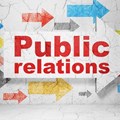Crisis communication can be defined as "the PR, media and communication process by which a business or an organisation deals with an unexpected high-profile negative issue." As a PR professional, it's all about getting your client out of the storm with the least amount of damage, whether it's to the organisation or its reputation.
But the digital era has made this a tricky landscape to navigate. Gone are the days where PR professionals had hours before a story broke, today it takes minutes and in some cases seconds - thanks to social media and the power of digital communication in general.
It never rains but it pours
There have been numerous corporate scandals over the years but 2018 saw an abundance of high-profile organisations making headlines for all the wrong reasons. For these organisations having a comprehensive crisis communication process encompassing of structure, order and disciple in place would have helped but having a team on hand that is equipped to help one deal with such situations with the least amount of damage became key and paramount.
Their fate and how this played out further emphasised how important it is to have a “switched on” crisis management team on hand. Something that is still viewed as an “unnecessary expense” however unforeseen events happens and happen when one least expects it.
These corporate events reinforce that organisations inevitably find themselves in undesirable situations, but few are well prepared to deal with them.
The importance of a crisis communication strategy
Reality is that during a crisis, companies are expected to implement a swift, unified and comprehensive response to any crisis situation, investigate and evaluate serious incidents for the purpose of preventing or minimising the impact of a future incident, appoint an experienced team to handle public and internal communication related to the event.
However, it is the PR professionals’ job, and I use the term “job” loosely to guide their client, advise them and carefully structure and monitor what they say, do and especially how they react.
Having a plan in place especially a crisis communication plan will make communicating with key members much easier. It’s all about being prepared because an organisation that can respond accurately and in the wake of the crisis gets ahead of the crisis and ensures confidence amongst those affected- whether internally or externally.
A bit of media training goes a long way
Yes, media training is important because it builds confidence however during a crisis one needs more than just confidence. PR professionals are an integral part of crisis management teams, they are entrusted with lifeboats. Prevention involves seeking to reduce known risks that could lead to a crisis.
Before you brief the press or issue a statement please remember the following:
Do your research, get to the bottom of the story even if it means asking the hard questions.
Have three key messages and do not for any minute stray from these. My colleague often refers to these as “the power of three”
Avoid traps- stick to your story even if the odds are against you. Avoid being negative, pointing fingers and offering misleading information- basically, stick to the facts and always go back to the three key messages.
Always maintain a professional physical stature.
What has past experiences taught us?
Crisis emphasises the importance and needs for adequate media training for senior management. Organisations should invest in media training to ensure all delegated staff that deal with the media are trained in media management and crisis response.
At the end of the day, media and crisis training ought to be extended to switchboard and reception personnel to guarantee that they are educated and are taught how to deal with starting enquiries from writers and how to guide calls to the significant individual because even a “no comment” or one small slip up will cost you dearly.
Unfortunately, media training doesn’t stop at interviews it includes unsolicited comments on social media.
Using social media to your advantage
The last thing a PR professional wants to see after that initial phone call informing them that there is a crisis is seeing their client in the headlines before they can even react. However, there are ways to benefit and take advantage of how to utilise social media to better serve you.
Even despite the risks of social media especially when you are facing a crisis, one can use it to their advantage. Even though your stakeholders and top management might not be on social media you can still use it to constructively steer the conversation around the crisis in your favour.
This must be planned, implemented and controlled and maintained by someone who has the skills needed to guide this ship. Because everything has its pros and cons. Here are a few to consider:
Social media gives PR professionals an instant voice and presence and an unlimited reach. They can either use this to reassure the public that they are well aware of the situation at hand and that they are in fact doing something about it.
This can be taken a step further by introducing specific #hashtags making it easy to track their campaign and make it trend or go viral. This will come in handy when it comes to evaluating your efforts and gathering information on how the public is reacting to your efforts.
The short end of the stick is that not everyone uses nor trusts information on social media and some of the stats or results might be inaccurate. This could add fuel to the fire and put the organisation at risk of having factually incorrect information being spread. We have all seen the negative effects of #fakenews.
At the end of the day a crisis can create three related threats namely public safety, financial loss, and reputation loss- are you willing to risk it? With that said having a comprehensive crisis communication process that is continuously updated and can be implemented is key.
However, having a team that implements structure, order and discipline at a drop of a hat could be the one thing that helps you get off a sinking ship.




































